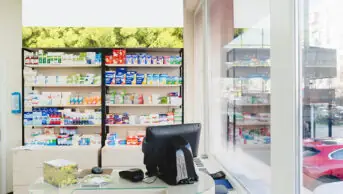
Shutterstock.com
The UK is facing a serious problem in its supply of medicines, which is driving up prices for the NHS, according to the head of sales at a major wholesaler.
Speaking at an event for members of the Association of Independent Multiple Pharmacies (AIMp) held near Birmingham on 29 September 2022, David McNicol, head of pharmacy sales at AAH Pharmaceuticals, described the global supply chain as “broken”, adding that the wholesaler is “seeing more manufacturers out of stock than we’ve ever seen over four years”.
McNicol said this was because of a “very fragile” global supply chain that is experiencing “raw material availability challenges; there’s [quality check] failings, [and] import costs”.
“From a manufacturing perspective, we have this really strange scenario where you can have, for one product, active pharmaceutical ingredients in China, you might have the raw material coming from Africa, packaging from the United States, production in India. If you get any one piece of problem in that complicated supply chain, it ends up with the final goods not getting dispatched on time,” he said.
As a result, McNicol said that when AAH orders a product, “it’s either not coming, or if it comes, it’s not in the quantity we expect it to [be] and, consequently, we have to work very hard around [this]”.
“That real complexity of the supply chain is truly driven by no overall coordination across the supply chain. There’s probably obvious reasons for that — colluding. Just can’t do it. But it means that we are all running around, trying to ensure that we will deliver on the patients’ needs every day.”
In September 2022, the government granted a record 159 price concessions for medicines such as alendronic acid and aripiprazole, owing to shortages, which pharmacists have warned are impacting patient care and potentially causing harm.
When asked why some products are experiencing significant price increases in recent months, McNicol said that, from a wholesaler perspective, “if we are not competitive, we don’t survive”.
“Manufacturers come at us. That’s the price. But can we negotiate that price? We try damned hard. But we have the responsibility to stock the line,” he said.
In February 2022, the Pharmaceutical Services Negotiating Committee told The Pharmaceutical Journal that medicine supply issues were behind a rise in generic medicines prices, attributing the shortages to COVID-19-related staff absences, changes in trading post-Brexit and increases in oil prices.
Medicines manufacturer Reckitt told The Pharmaceutical Journal in October 2022 that a shortage of medical grade sodium alginate had caused supply issues of Gaviscon Infant.
Shortages have also affected glucagon-like peptide-1 receptor agonists semaglutide and dulaglutide, with a spokesperson from the Department of Health and Social Care saying earlier in October 2022 that it is working on guidance to help prescribers navigate the supply problems.
In August 2022, more than half of pharmacists responding to a survey by The Pharmaceutical Journal said that medicines shortages have put patients at risk “in the past six months”.
1 comment
You must be logged in to post a comment.



This problem has existed for many, many years. It not only impacts patients but it's extremely stressful for pharmacists.
Nobody has ever done anything about it that has made any real difference.